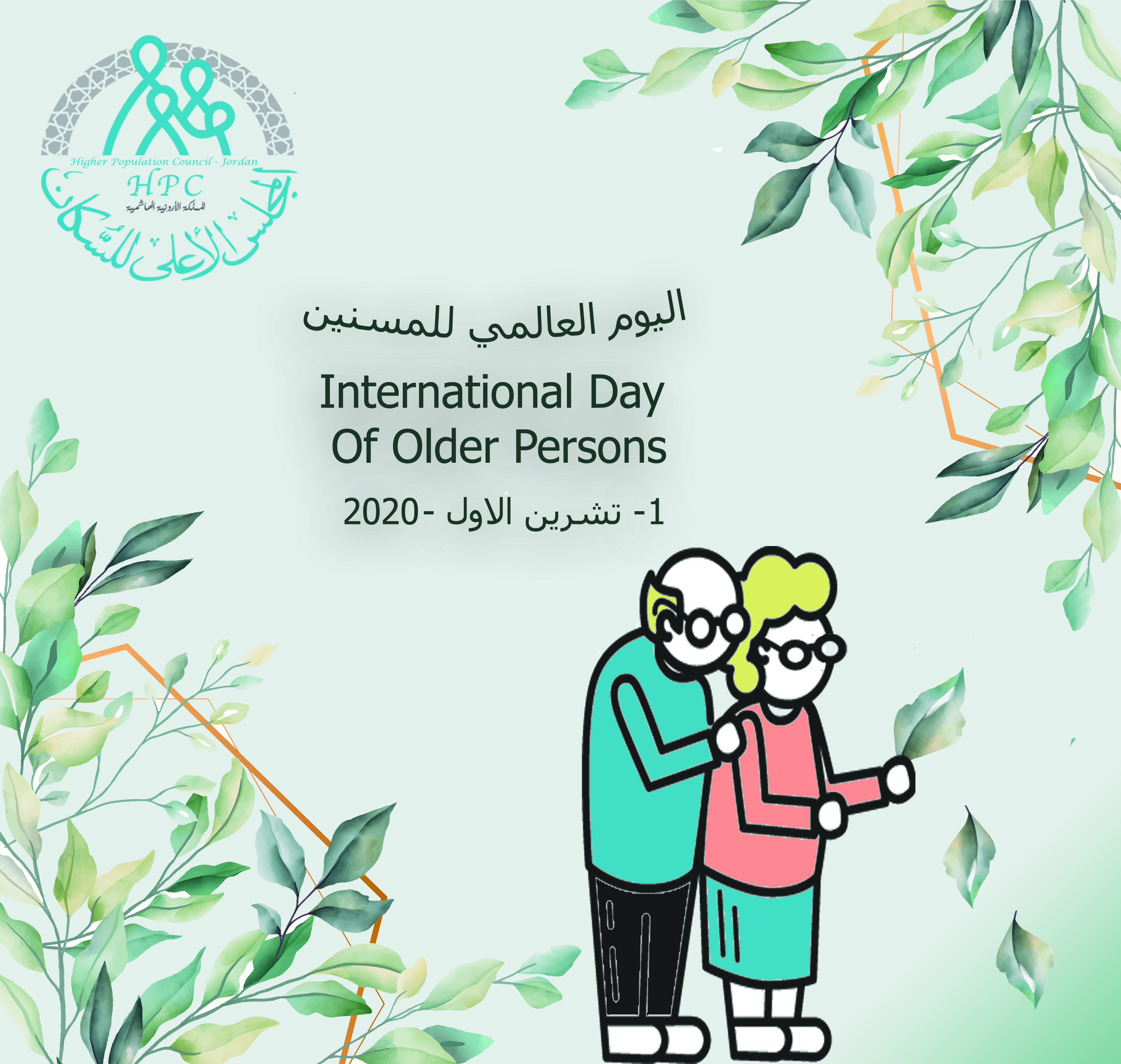

Today, Thursday, September 1, 2020, marks the 30th International Day of Older Persons, which aims to raise awareness of the health needs of older persons and their contribution to their health and societies. This occasion is also an opportunity to achieve a better understanding of the impact of Covid-19 on older persons, as well as on healthcare policy and planning.
In a special press release issued on this occasion, HPC Secretary General, Dr. Abla Amawi, noted that according to the Housing and Population Census of 2015, the percentage of older persons (aged 65+) reached 3.7%, or 518.757 persons, with females representing 49.1% and males representing 50.9%, while life expectancy at birth was 74 years for females and 72.5 for males.
Amawi indicated that the percentage of older persons in Jordan is expected to rise over the next years, as per the Demographic Opportunity Policy Document of 2017, to 8.6% by end of 2040, the year on which the demographic opportunity reaches its peak. Amawi added that there are 703 million persons aged 65 years and above around the world, and the number is projected to increase over the next three decades to reach 1.5 billion in 2050.
“While Covid-19 poses a risk to all age groups, older persons are more vulnerable to complications leading to death, or incurable complications following a Covid-19 infection, as Covid-19 related deaths are five times higher among those over the age of 80 compared to other age groups globally,” Amawi explained. Moreover, Amawi said that 66% of persons over the age of 70 suffer from at least one illness, making them highly vulnerable to Covid-19 infection, and that the spread of the disease will reduce access to emergency medical services, thereby putting the lives of older persons at higher risk.
Amawi further said that Covid-19 affects those who have chronic illnesses, especially older persons, more than others. According to a study carried out in 2017 on the situation of older persons in Jordan, 86% of older persons in Jordan suffer from chronic diseases, including hypertension, cholesterol, diabetes, cardiovascular diseases, and chronic kidney failure. According to the Population and Family Health Survey (2017-2018), the percentage of persons aged 60 and above who are diagnosed with diabetes reached 34.6% among females and 29.3% among males, while the 2018 National Registry of Renal Diseases by the Ministry of Health, shows that 1,114 males aged 60 and above have chronic renal failure, compared to 999 females.
The “Economic Impact of Covid-19 on Older Persons in Jordan” Policy Paper by the National Council for Family Affairs in 2020 showed that the percentage of still-working seniors in Jordan reached 2.3% of the total workforce by the end of 2015, with 2.6% males and 0.4% females. The paper also provides that older persons in Jordan, like the rest of the world, have been impacted by the Covid-19 pandemic and are at a higher risk of losing their jobs. Many of them work temporarily in handcrafts, agriculture or from home and bear a significant burden from losing their work and/ or not being able to market their products.
The Higher Population Council (HPC) explained that the Government of Jordan has taken a number of measures during the pandemic to respond to the health and economic needs of older persons in Jordan. The Ministry of Health launched an e-platform for dispensing chronic disease medication through MOH healthcare professionals without the need to visit a healthcare facility. The Ministry of Social Development took precautionary measures at elderly care homes by disinfecting buildings, water tanks and health facilities, maintaining hygiene and cleanliness, and measuring the temperature of beneficiaries as they enter the care homes. The Social Security Corporation provided in-kind assistance in the form of food items, to citizens, including older persons in need of emergency support. The Government also established a Covid-19 national aid fund “Himmat Watan” as well as a special account “Al Khair” at the Ministry of Social Development for the benefit of disadvantaged and needy families. In addition, non-governmental organizations and charities (e.g., Jordan Hashemite Charity Organization, and Tkiyet Um Ali) have assumed a humanitarian role that complemented the efforts of the government during the pandemic.
HPC noted that while government measures have been generally citizen-centric, there is a need for economic programs and measures targeting older persons in particular. In this context, HPC recommends allocating contingency funds in the budgets of concerned ministries to cover unforeseen events affecting older persons, ensuring that the adopted economic measures provide the needed support to small and medium sized enterprises owned by older persons to ensure their continuity, and dispersing immediate cash assistance by the Social Security Corporation for retirees whose pension is below the poverty line.







